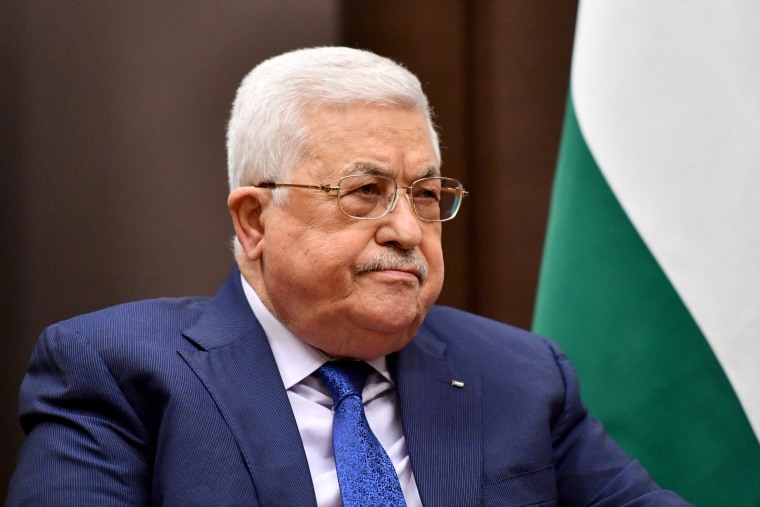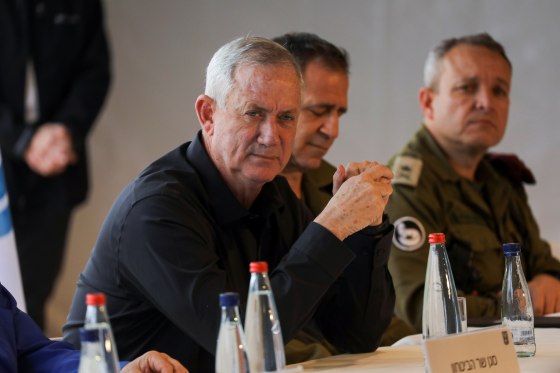Israel’s defense minister approved a raft of measures aimed at improving relations with the Palestinians on Wednesday following a rare meeting with Palestinian President Mahmoud Abbas.
Benny Gantz met with Abbas at his private residence in a Tel Aviv suburb late Tuesday. It was the first time Abbas met an Israeli official inside the Jewish state since 2010.
The pair discussed security coordination between Israel and Abbas’ Palestinian Authority, which administers pockets of the occupied West Bank.
Gantz’s office said he approved “confidence-building measures,” including the transfer of tax payments to the Palestinian Authority, the authorization of hundreds of permits for Palestinian merchants and VIPs, and approving residency status for thousands of Palestinians in the West Bank and the Gaza Strip.

Israel collects hundreds of millions of dollars worth of taxes on behalf of the Palestinian Authority as part of the interim peace agreements signed in the 1990s.
The tax transfers are a key source of funding for the cash-strapped Palestinians, but Israel has withheld funds over the Palestinian Authority's payment of stipends to thousands of families that have had loved ones killed, wounded or imprisoned in the conflict. Israel says the payments incentivize terrorism, while the Palestinians say they provide crucial support to families in need.
Israel approved residency for some 9,500 Palestinians. It controls the Palestinian population registry, and over the years its policies have left an estimated tens of thousands of Palestinians without legal status, severely limiting their freedom of movement, even within the occupied territories. Israel granted legal status to some 4,000 Palestinians in October.
Israeli Prime Minister Naftali Bennett is opposed to Palestinian statehood. His government has shown no interest in reviving peace talks, which broke down more than a decade ago, but has said it wants to reduce tensions by improving the living conditions in the West Bank.
Recent months have seen a surge in violence by Israeli settlers against Palestinians in the West Bank and Palestinian attacks on Israelis in east Jerusalem and the West Bank.
“It’s in Israel’s interest, maybe even more than the Palestinian interest that the Palestinan Authority doesn’t collapse,” professor Yossi Mekelberg, an associate fellow on the Middle East and North Africa Program at the London-based think tank Chatham House, told NBC News on Wednesday.
He added that alleviating some of the economic pressure would help Abbas consolidate his power.
“When people don’t have jobs and there is no income, this puts pressure on the PA,” he said, adding that it “pushes the moderates into the hands of the extremists.”
In an incident Wednesday, the Israeli military said a civilian was injured by gunfire from the Gaza Strip, the first instance of cross-border violence along the border of the Palestinian enclave in months. The military said it responded with tank fire at multiple Hamas militant positions in the Gaza Strip.
Gantz’s meeting with Abbas — the second in the six months since Bennett’s coalition government took office — drew vocal criticism from Israeli opposition lawmakers, including former Prime Minister Benjamin Netanyahu’s Likud party, the largest in parliament.
“All of us will pay the price of war for the disgrace that we saw this evening,” former lawmaker Shuli Mualem-Refaeli, a member of Likud, tweeted.
However, Regional Cooperation Minister Esawi Frej tweeted that progress could only be made with meetings, which he said were “vital for establishing trust between the sides and for preserving the political horizon.”
The Palestinians seek an independent state that includes all of the West Bank, east Jerusalem and the Gaza Strip, areas Israel captured in the 1967 Mideast War.
Hamas seized Gaza from Abbas’ forces in 2007, a year after the Islamic militant group won a landslide victory in parliamentary elections. Gaza has been under an Israeli-Egyptian blockade since then.


